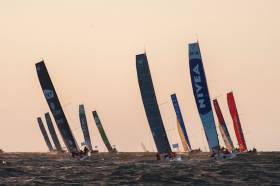Displaying items by tag: OC Sport Pen Duick
Plymouth No Longer Host Of Transat 2020 Start As Race Moves Across The Channel To Brest
The next edition of The Transat will now start in the French port city of Brest instead of Plymouth, race organisers have announced.
Plymouth on the Devon coast was originally confirmed over a year ago as the start venue for the 2020 edition of the four-yearly event, the first and oldest single-handed transatlantic race in history.
No explanation has been given for the switch away from Britain’s Ocean City, other than race owners and organisers OC Sport Pen Duick saying that the change comes as it looks “for innovative ways to secure the future of The Transat”.
“We are really pleased to be partnering with Brest for The Transat, and together we share a strong desire to continue developing the race in 2020 and beyond,” OC Sport CEO Hervé Favre said.
“We have seen from races such as the Route du Rhum-Destination Guadeloupe [also owned by OC Sport Pen Duick] just how engaged the French public are with offshore sailing where we had over two million visitors to the race village.
“Staging the start from Brest is a real opportunity for our sponsors and the teams to capitalise on this captive audience and we expect it to open up many new commercial opportunities which are essential to guarantee the longevity of the race. I’d like to thank Plymouth for their support of the race up until this point.”
The Transat will celebrate its 60th anniversary when the world’s top solo sailors gather to race 3,500 nautical miles across the North Atlantic this time next year.
While the race was born in the UK, its organisers say it has always attracted the French elite of offshore sailing, who in recent years have dominated the race.
Last year Plymouth was also the focus of rumours that it might lose out as the traditional start of the Rolex Fastnet Race to a French port, though that speculation was swiftly shot down by the RORC which said it was working to make the Plymouth start even “bigger and better”.
























































